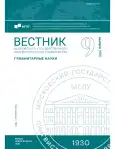Cluster Approach to the Description of Youth Slang in Internet Communication
- 作者: Kartavtseva J.V.1, Khachmafova Z.R.2
-
隶属关系:
- Kuban State Technological University
- Adyghe State University
- 期: 编号 9(903) (2025)
- 页面: 45-52
- 栏目: Linguistics
- URL: https://journal-vniispk.ru/2542-2197/article/view/341922
- ID: 341922
如何引用文章
全文:
详细
The aim of the study is to substantiate the effectiveness of the cluster approach in classifying and systematizing youth slang in modern Internet communication. The study is based on data from the Russian-language social networks VKontakte and Telegram. To achieve this goal, the following methods are used: contextual and definitional analysis, content analysis, cluster analysis and thematic classification. The main thematic clusters and subclusters that combine youth slang vocabulary in meaning, context of use and emotional coloring into a single system are identified, which made it possible to identify patterns of formation and functioning of youth slang in modern Russian linguoculture.
作者简介
Julia Kartavtseva
Kuban State Technological University
编辑信件的主要联系方式.
Email: kartav-yuliya@mail.ru
Senior Lecturer, Russian Language Department at the Institute of Fundamental Sciences, Kuban State Technological University
俄罗斯联邦Zaineta Khachmafova
Adyghe State University
Email: zaineta@nextmail.ru
Doctor of Philology (Dr. habil.), Professor, Head of the Department of French and German Philology
俄罗斯联邦参考
- Zimareva, O. L., Pesina, S. A. (2019). Cluster Analysis of Polysemous Word Semantic Structure in the Light of Invariant Theory. RUDN Journal of Language Studies, Semiotics and Semantics, 10(4), 860–870. (In Russ.)
- Tang, L. (2024). Linguistic politeness in social networks. Synthese, 203(6), 204. doi: 10.1007/s11229-024-04642-8.
- Kurochkina, M. A., Kushneruk, S. L. (2023). Linguocognitive markers of the loss of personal identity in the era of social networks. Cognitive studies of language, 3–1(54), 360–365 (In Russ.)
- Guseynova, I. A., Gorozhanov, A. I., Kudinova, E. S. (2021). Translationgenius and social networks. Science Journal of Volgograd State University. Linguistics, 20(3), 55–64. doi: 10.15688/jvolsu2.2021.3.5.
- Kamalidin, K. E. (2024). Language and communication style in social networks vkontakte and wechat. Mir nauki, kultury, obrazovaniya, 2(105), 384–386. doi: 10.24412/1991-5497-2024-2105-384-386. (In Russ.)
- Khomyakov, V. A. (1980). Nestandartnaya leksika v strukture anglijskogo yazyka nacional’nogo perioda = Non-standard vocabulary in the structure of the English language of the national period: abstract of senior doctoral thesis in philology. (In Russ.)
- Rozina, R. I. (2002). Kategorial’nyj sdvig aktantov v semanticheskoj derivacii = Categorical shift of actants in semantic derivation. Voprosy Jazykoznanija, 2, 3–15. (In Russ.)
- Orlova, N. O. (2004). Sleng vs zhargon: problema definicii = Slang vs jargon: the problem of definition. Yaroslavl Pedagogical Bulletin, 3(40), 36–39. (In Russ.)
- Khrolenko, A. T. (2009). Osnovy lingvokul’turologii = Fundamentals of linguoculturology. 5th ed. Moscow: FLINTA. (In Russ.)
- Komalova, L. R. (2016). Tipologiya mul’tilingval’noj verbalizacii ehmocional’nogo sostoyaniya “agressiYA”: na materiale raznosistemnykh dannykh korpusnoj lingvistiki = Typology of multilingual verbalization of aggression on the basis of heterogeneous system data of corpus linguistics: senior doctoral thesis in philology. Moscow. (In Russ.)
- Vlasyuk, O. I. (2018). Klastery sluzhebnykh slov vo fraze: tipichnye morfologo-semanticheskie modeli soedinenij i ikh prosodicheskaya struktura = Clusters of service words in a phrase: typical morphological and semantic models of compounds and their prosodic structure // Lingvistika, lingvodidaktika, lingvokul’turologiya (pp. 8–11): current issues and development prospects: proceedings of the II International Scientific and Practical Conference, Minsk, March 1–2, 2018. Minsk: Belarusian State University. (In Russ.)
- Bulyga, F. S., Kureichik, V. M. (2021). Algoritmy aglomerativnoj klasterizacii primenitel‘no k zadacham analiza lingvisticheskoj ehkspertnoj informacii = Algorithms of agglomerative clustering applied to the tasks of analyzing linguistic expert information. Izvestiya SFU. Izvestiya YUFU. Tekhnicheskie nauki, 6(223), 73–88. (In Russ.)
- Buyanova, L. Y. (2023). Cluster as a categorical classification structure of terms systematization: prezentative-integration aspect. Cognitive studies of language, 1(52), 147–152. (In Russ.)
- Khorosheva, N. V., Madey, E. D. (2023). Actualization of emotive meanings in translations of A. P. Chekhov’s plays: a cluster approach. Language and culture, 63, 77–99. (In Russ.)
补充文件










